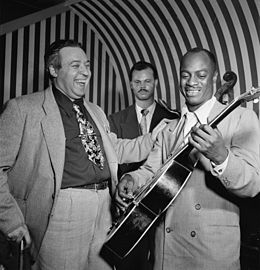Hugues Panassié

Photograph by William P. Gottlieb .
Hugues Panassié (born February 27, 1912 in Paris , France, † December 8, 1974 in Montauban , France) was a French jazz author, jazz saxophonist and co-founder of the Hot Club de France . In France he was known as the “jazz pope”.
Life
He studied at the college in Villefranche in the French county of Rouergue , but had to interrupt this in 1928 because of polio .
In 1934 he wrote one of the first jazz books based on questioning the black musicians themselves, Le Jazz Hot , using the information and connections of Mezz Mezzrow in particular . Before that, jazz in Europe was mainly understood as music (white) dance orchestra. Many more books on jazz (and one on rugby too ) followed.
In 1932 he founded the Hot Club de France with Charles Delaunay (on Rue Chaptal in Paris). He wrote for early jazz magazines such as La Revue du Jazz , Jazz Tango Dancing and Le Jazz Hot, founded by Delaunay in 1935 . From 1950 he published his own Bulletin du Hot Club de France (later supported by Madeleine Gautier).
From 1937 he was on the advisory board of the American Hot Record Society . He also financed and organized recordings by jazz musicians, such as the legendary Panassié Sessions 1938 with Mezz Mezzrow, Sidney Bechet , Tommy Ladnier (whom he found after a long search), Sidney De Paris and James P. Johnson . Bechet's music was broadcast by resistance transmitters during the German occupation and greatly boosted its popularity. Even during the war he continued to purchase records from Portugal. When a German official asked him for one of the titles - “Tristesse de Saint Louis” on the cover, inside St. Louis Blues by Louis Armstrong - he said it was about poor Louis IX. In 1938 and 1949 he spent long periods in the USA .
Like quite a few jazz enthusiasts, he had fanatical convictions. After the war he began a dispute with Delaunay about the music of modern jazz , which celebrated success in France after the war , which he agreed to deserve the name jazz (the title of one of his books is La véritable musique de jazz , which he proposed mainly meant the New Orleans style). He even mailed an outright indictment to the hot clubs in France. But he was also otherwise a purist - on one occasion he even complained to his friend Louis Armstrong that he should please play “à la Niou” (New Orleans).
In 1948 he founded the first European jazz festival in Nice , with Louis Armstrong , Earl Hines , Rex Stewart and Mezz Mezzrow performing.
From 1938 he lived in Montauban , where today jazz festivals take place in his memory. His record collection has been preserved as a whole and is located in the "Médiathèque de Villefranche-de-Rouergue " in the Aveyron department .
Works
- Le Jazz Hot , Éditions Corrêa, 1934, English 1936
- Hot Jazz Records , ed. RCA Victor, Camden, New Jersey, 1939
- La Musique de Jazz et le Swing Editions Corrêa, 1943
- Les Rois du Jazz Editions Ch. Grasset, Geneva, 1944
- La Véritable musique de Jazz Éditions Robert Laffont, 1946, 1952
- Douze Années de Jazz (1927-1939) , Éditions Corrêa, 1946
- Le Rugby , Éditions Les Presses Rapides, 1946.
- Cinq mois a New York (Octobre 1938-Février 1939) , Éditions Corrêa, 1947
- Jazz Panorama , Éditions des Deux-Rives, 1950
- Quand Mezzrow enregistre , Éditions Robert Laffont, 1952
- Dictionnaire du Jazz , 1954 (with Madeleine Gautier), Éditions Robert Laffont, 1954, and 1971 Éditions Albin Michel, 3rd edition 1987
- Petit Guide pour une discothèque de Jazz , Editions Robert Laffont, 1955
- Discographie critique des meilleurs disques de Jazz , Editions Robert Laffont, 1958
- Histoire du vrai Jazz , Éditions Robert Laffont, 1959 (German history of real jazz , Bertelsmann 1962)
- La Bataille du Jazz , Editions Albin Michel, 1965
- Louis Armstrong , Nouvelles Éditions Latines, 1969.
- Monsieur Jazz- Entretiens avec Pierre Casalta (autobiography), Éditions Stock, 1975
literature
- Christian Senn Hugues Panassié 1995
Web links
Remarks
- ↑ A standing expression in French today, a quote from English hot jazz .
- ↑ Also one of the earliest French books on jazz. In 1932 in Aux frontières du Jazz, the Belgian Robert Goffin brought jazz into connection with the simultaneous surrealist trend.
- ↑ Published July 1929 to March 1930 and addressed the professional music scene. Even Stéphane Grappelli , at that time with "y" at the end, wrote it, he recorded as a "y"
- ↑ Appeared from 1930. Also for professional musicians. It later became the Magazine du Jazz
- ^ Mezz Mezzrow, autobiography Really the Blues . Foreign evergreens were banned, as in Germany, and were generally sold or played under local names.
| personal data | |
|---|---|
| SURNAME | Panassié, Hugues |
| BRIEF DESCRIPTION | French music critic |
| DATE OF BIRTH | February 27, 1912 |
| PLACE OF BIRTH | Paris , France |
| DATE OF DEATH | December 8th 1974 |
| Place of death | Montauban , France |